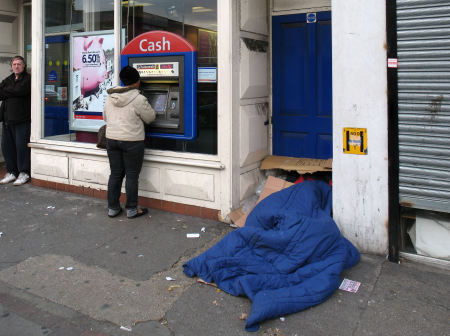Homelessness amongst the young in Britain has increased sixfold over a year due to the Government’s controversial welfare reforms, according to a new report.

A study by Homeless Link, the umbrella body for homelessness organizations, shows homelessness among Britons under the age of 25 has soared from 1.7 percent in 2013 to 10 percent this year. The organization said the report showed clear signs that the Tory-led coalition’s tougher regime of benefit sanctions is forcing young Britons onto the streets.
The survey of more than 200 homelessness charities and council agencies across England also found that 90 percent of providers assert that the government restrictions have affected young people’s ability to access new housing accommodation.
In 2012, Prime Minister David Cameron’s government imposed a tougher regime of sanctions for those claiming Job Seekers Allowance and Employment Support Allowance. Measures included increasing the requirements to qualify and the amount of time for which claimants can be penalised.
Rick Henderson, Homeless Link’s chief executive, said nearly all the charities questioned reported that young people were suffering under the Government’s benefit cuts.
“We know that early experience of homelessness can lead to the development of significant problems in later life, and for young people who find themselves in crisis, the benefits system should provide a safety net to help prevent this from happening,” said Henderson.
He added: “Nearly all the charities we spoke to reported that young people were being affected by benefits being cut. We urge the DWP [Department for Work and Pensions] to take the recommendations in the report seriously and ensure that those in most need are not pushed further into destitution.”
A Government spokesman said: “The reality is homelessness is down year on year by two per cent and our welfare reforms are improving the lives of some of the poorest families in our communities. Sanctions are only used in a small number of cases as a last resort, with a well-established system of hardship provision available for sanctioned claimants.”
The report was launched on Wednesday (November 19) at the Young & Homeless 2014 conference in London. It also revealed that more than half of those who approached local authorities and charity services for help with housing in August were under 25, suggesting the scale of youth homelessness is higher than reflected in official figures.
Government figures record formal applications to councils, while Homeless Link’s research takes into account those going directly to councils and homelessness services for help.
Being homeless at a young age is proven to increase the risk of becoming homeless again and developing complex problems in later life. The report suggests work to prevent young people losing their home is simply not good enough in many areas:
The range of prevention methods used by some local authorities has improved. For example, 92% now carry out home visits which can help identify risks at an earlier stage. However, 40% of councils believe they do not have the tools they need to prevent youth homelessness, and homelessness was not prevented by councils in 8 in 10 cases where young people approached them for help.
6 in 10 young people become homeless due to family or friends no longer being able accommodate them, with relationship breakdown the most common cause. Family mediation can be effective in supporting young people to stay at home, yet nearly a quarter of councils still do not offer this service.
Remaining at home is not suitable for some young people, such as those at risk of abuse or violence, and the report also highlights the need for alternative housing options for this group, such as nightstops or emergency supported accommodation. The research suggests a shortage of suitable accommodation is forcing local authorities to use other, unsuitable options with 94% saying they have placed young people in bed & breakfasts.
The research also found that 58% of under 25s seeking help from councils and charities with homelessness have one or more other problem such as mental health, learning disability, substance misuse or offending behaviour. Half of agencies believe problems faced by young people have got worse. The range of complex problems faced by young people underline the need for effective support to help them leave homelessness behind. Nearly six in 10 (57%) of those seeking help are not in education, employment or training. Around a quarter report mental health or substance misuse problems. 13% of those seeking help were young offenders and 11% were care leavers.
The report calls for mediation, advice and support services to be available in every local authority area to families and young people at risk of homelessness. Schools and other agencies working with young people should also play a part in preventing homelessness through education, as well as early identification and appropriate referral of those at risk.
The current coalition government launched austerity measures when it came to power in 2010 in a bid to tackle the country’s mounting debt and sluggish growth, but the policies have sparked opposition and public protests in recent years.
According to Homeless Link’s Rick Henderson: “Too many young people are being denied the opportunities to realise their potential that most take for granted. We know that local authorities are under incredible financial pressure, but intervening early saves lives and money. We’re calling on all local areas to ensure young people and families are given the support they need to prevent homelessness and the development of issues that can be difficult to overcome.









